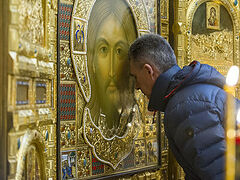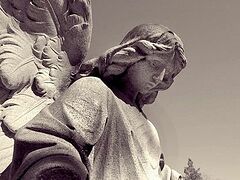The fast has begun—a time of repentance. Several Orthodox pastors share their experience of repentance and forgiveness of offenses, and talk about how to attract God’s grace-filled help, in order to acquire the strength to forgive our enemies and thereby fulfill our Christian duty.
How satan appeared to me
Metropolitan Neophytos (Masouras) of Morphou:
Once I was providentially with Fr. Simeon in the city of Larnaka, Cyprus. He was an iconographer. Beyond that, he was clairvoyant. He could see a person through and through. But our personalities turned out to be direct opposites. I was also still young at the time… So, I remember that abba Simeon patiently and did not reprimand me; only after four years did he tell me about one of my failings. I have a sharp and irascible personality. So it’s understandable why the elder didn’t give me any reprimands…
But one day he nevertheless talked with me a little more sternly than usual. I didn’t lash out in anger, but I did take offense. I didn’t say a word to my father-confessor for four days. And do you know why I started talking to him again? Because on the fourth day, satan visited me. Grace abandoned me and I found myself in the demon’s paws. I felt I was an ant and sensed my total helplessness, not only spiritual but physical. That day we were celebrating the feast of St. Spiridon, Archbishop of Cyprus. “St. Spiridon, preserve me like you preserved your sheep,” I prayed. He was a shepherd, and I made a resolution to humble myself like a sheep. This was a very important lesson for my whole life. The saints help us, but our closest helpers in their image are our fathers-confessors.
I felt that humility, especially before our elders, is the beginning of repentance. Obedience to an elder and humility before him protects us from satan. The heart is freed from desires, from reason—from thoughts—and then you suddenly realize that you like to see your own failings! Not your advantages and good traits, which maybe you really do have, but precisely the passions! A hunter instinct even wakes up in you.
And do you know what the point is in this? What we see in ourselves decreases in us! If we see something good in ourselves, then to keep us from getting proud we are deprived of our positive qualities. Do you really need that?! This is the beginning of temptation. Contradicting the Lord’s Prayer, “And lead us not into temptation, but deliver us from the evil one,” we’re inviting those “tangalashki” [that is, the demons], as St. Paisios the Athonite called them, into our lives. And in the classic of patristic literature St. Isaac the Syrian said, “The boastful monk gives himself into to the devil’s hands.” If we praise ourselves, then what are we preparing for ourselves? We set ourselves up to be put to shame. Will an intelligent person lacerate himself like that? Therefore it’s very important to repent, to reveal our sins to our father-confessor and thus humble ourselves. But first we have to learn to see the defects, deformations, and wounds in our souls. Sometimes they are so malodorous that we run immediately to the doctor in the epitrachelion for healing, for some kind of penance, like cauterization with iodine.
We recognize true repentance only when we begin our path with humble obedience to our elder. It is precisely by this key of obedience that we open the door of repentance. And then you enter into such a depth that you can receive gifts from God. This is the most interesting part.
I was also acquainted with Elder Sophronius (Sakharov), a Russian emigrant, the founder of the monastery of St. John the Baptist in Essex, England, and sotainik1 of St. Silhouan the Athonite. He advised me to keep the name in my mind of someone I’m offended at, or in general have some negative feelings against—enmity, dislike, envy, or anger—and pray with basically these words: “Christ, I ask You, forgive Natalia, and forgive me. Christ, I ask You, enlighten Natalia, and enlighten me. Christ, I ask you, have mercy on Natalia, and have mercy on me…” We should unite in this way in prayer the Name of Christ with the names of our offenders. Because the Lord is Love. And everything that comes into contact with the Name of Christ cleanses away all—including our own—passions of judgment, slander, and the malice of distortions, and illumines our hearts and consciousness. In this way we can acquire in practice the gift of love for our enemies (Mt. 5:44). Otherwise we are not disciples of Christ, we are not Christians. We are the disciples of someone quite different… The master distorter. However, if after praying that way I see that the negative feelings are not going away, it means that my prayer was not heard! Then I write down the names of those with whom I have a problem and give those names along with the words of that prayer to other people—to spiritual fathers whom I trust—so that they would pray about it. Then I wait to see what will happen next…
I think that this peacemaking in Christ with those whom we are inclined to consider our enemies is the most important work that every Christian is obligated to do in his own heart. Otherwise, what kind of Christians are we, and how can we talk about love if we have not even learned how to forgive? But! Neither should we be deluded. We cannot forgive anyone of our own selves. We cannot force ourselves to forgive simply because “we have to”. That means that whether we want to or not, we have to begin praying regularly for that person. The Name of Christ possesses colossal energy; it illumines everything and everyone we join to Him; it illumines also our mental universe, purifies it; our souls become brighter and we see people as utterly beautiful, even intelligent. And this is reconciliation—which is, by the way, necessary before every Communion, otherwise we mustn’t commune—blesses the world of our hearts. This is that very “spirit of peace”, thanks to which the Lord saves thousands around us who we might have been inclined to judge. For there is none other name under heaven given among men, whereby we must be saved (Acts 4:12). So let’s be saved! And let’s not receive Communion unto our own condemnation. This is why there are so many deaths allowed.
I guarantee that if you will pray this way, as Elder Sophrony (Sakharov) taught me, then if you have some problems with a certain Gregory, by praying for him, joining both of your names with the Name of Christ, the person you always supposed to be an offender will turn from being hyper-problem for you into a blessing from God. You yourself will thank God, saying: How much I’ve received through that person! What a great guy he is for coming into my life! How much I would not have gotten or understood if it were not for that person who I at first thought was a rogue!
I personally know people who have made true spiritual ascents, which they began by taking a look into their own hearts to search out there those with whom they’ve had some friction. And they prayed for them all! Moreover they eventually delved more and more deeply into life, took apart the past, remembered every person they’d ever had not just a serious conflict with, but even the slightest omission or misunderstanding, and prayed for them while remembering their own names—and mainly, uniting them with the Name of Christ. Their hearts, having been liberated from these rusty, rotten, burdensome gripes, and the truly serious conflicts and mutual displeasure, began to shine like hell exploded by Christ’s victory! This resounding Pascha so inspired them that they thirsted more and more for these fireworks, searching in the most scrupulous way for more fuel: Where, with whom, and when did they ever fight in life?! It even became interesting to set all this ballast on fire. It is unbelievably liberating. By praying for all those whom we ourselves have troubled, or whoever caused us any kind of pain, we can, besides all else, bridle our minds with humility in an excellent way. And that’s the most important thing for saving the equipment!
Everything is applicable to spiritual life: Mathematics, literature, and the basics of military training
Archpriest Valerian Krechetov, rector emeritus of the Church of the Protection and the Church of the New Martyr and Confessors of the Russian Church in Akulovo:
Our whole lives are calculated in an economic aspect. But the most precious thing is the salvation of the soul. But how can we attain salvation? Only by cleansing ourselves of sins. And the Lord forgives sins. He forgives the sins of those who forgive others’ sins. Remember, we pray every day: “And forgive us our debts, as we forgive our debtors.” This means that the more you forgive, the more you are forgiven. Therefore we have to rejoice if someone offends us—you also receive the opportunity to forgive him! You forgive, and you are forgiven. You forgave, and now you’ve received an advance on forgiveness. And this is for sure: Whoever reproaches or berates us is giving us a gift.
At the foundation of all lies salvation of the soul; and such, precisely with love, is the Christian relationship to everything. Man is after all made in the image and likeness of God, and in the depths of each person’s heart is the longing for goodness and perfection. “We need to learn how not to hinder God”, said Metropolitan Pitirim (Nechayev).
And with respect to what happens, not long I ago heard this parable:
There were once two friends. One of them got angry and struck the other on the cheek. The one who was struck wrote on the sand, “Today my friend hit me.” Some time passed and the one who was struck began to drown. And the one who hit him forgot everything and ran to save him. Then that man carved on a rock, “Today my friend saved my life.”
Offenses must be written on the sand, so that they would disperse. But we need to inscribe good deed in stone. There is an expression: “Remember the one who does something good to you; but if you’ve done something good for another, forget about it.”
Do you know what our holy admiral Feodor Ushakov commanded those close to him? First: Try to do everything yourself. Second: Sleep less. Third: Learn all your life. We even have a saying: You live and learn. Probably you’ve all heard it. But few remember the rest: “You live and learn how you must live. Don’t learn just anything. We tend to learn everything but what we need to learn. And forgiving offenses is the most important science.
Unfortunately, only snippets of our many sayings have remained. Once a batiushka admitted to me, “I read your sermon and was stunned.” I don’t remember the words, of course. But on Forgiveness Sunday, how do we usually answer the request for forgiveness? “God forgive” But that is only part of the answer! The full answer is: “May God forgive me, as I forgive you.” Excuse me, but that is responsibility! And not just waving someone on, saying, “God forgive”. May God forgive me, as I forgive you. You won’t want to get offended too often if you know what a responsibility this phrase leads you to.
Apparently Mikhail Lermontov wrote differently about such irresponsible burners-away of life:
I gaze with grief at our generation,
Its future either empty, either dreary,
The while ‘neeth weight of doubt and education
Inaction makes it old and weary.
That is, under the weight of learning what it doesn’t need to know, and in doubt of what it’s imperative to know. It’s the same with our traditions that have been emasculated in the bits and pieces of sayings that have come down to us.
And as for inaction—Alexander Pushkin wrote well about this. Do you remember how Tatiana Larina came to Eugene Onegin’s estate to find out what her idol had been raised on? She found several novels by Lord Byron, where “modern man was reflected very accurately.” And how was it reflected?
With his immoral soul,
He was so vain and droll,
Over-given to his daydreams
With his mind so resenting
In empty deeds fomenting.
Well the whole problem lies in the fact that people are occupied with empty deeds. You can’t say that they are doing nothing. Everyone is very busy with something. But just inquire about what is in his soul. “I consider such-and-such.” He replies. “Forgive me, but you don’t consider anything! It’s all been considered for you. You’ve only heard it and accepted it, but it’s not yours.”
Goodness is primordial, but the Lord allowed evil to act in the world precisely in order for man to make a choice. To forgive, or not to forgive? To be offended, or to not be offended? Otherwise, if you only know one thing, but don’t even think about another, then your own opinion is in any case not yours. Our goodness is also not ours—it’s Gods. It is always our choice: Will we receive gifts from God, or from someone else? Whose disciples are we?





